
Ever felt like parenting after a divorce could use its own playbook—complete with chapters on bedtime negotiations, homework diplomacy, and who’s driving to soccer practice on Thursday? You’re not alone. Custody disputes can turn even the most organized family calendar into a maze, and the stakes are never higher than when your child’s school life and future are on the line. That’s why it’s so important to know What Are the Most Common Issues in Texas Child Custody Cases I Should Know before you’re knee-deep in legal forms and emotional conversations.
In short, the most common custody issues revolve around where your child will live, how much time they’ll spend with each parent, and who makes the big decisions about their education and healthcare. But here’s the twist—these legal choices can have a surprisingly direct impact on your child’s academic performance. From keeping school routines stable to preventing unnecessary moves between districts, your custody arrangement could be the deciding factor in whether your child thrives or struggles in the classroom.
Keep reading, because in this article you’ll get more than just a legal overview. You’ll find practical tips you can apply today, real-life examples from Texas cases, and behind-the-scenes insights most parents never hear until it’s too late. We’ll break down how judges look at academic stability in custody decisions, what parenting plan provisions can safeguard your child’s school success, and how our team at The Law Office of Bryan Fagan, PLLC helps parents protect both their legal rights and their child’s educational future.
Key Takeaways
- In Texas, child custody is defined as ‘conservatorship,’ encompassing various types of custody arrangements including Sole Managing Conservatorship, Joint Managing Conservatorship, and Possessory Conservatorship, each with distinct implications and responsibilities.
- Common disputes in custody cases primarily involve decisions about the child’s primary residence, visitation schedules, and relocation challenges, with emotional and psychological effects on children often resulting from ongoing custody battles.
- The Texas Family Code prioritizes the child’s best interests in custody arrangements, guiding courts in evaluating various factors to determine custody, while parents are encouraged to seek legal assistance and effective communication to navigate the complexities of custody disputes.
Understanding Custody Types in Texas
In Texas, child custody is legally referred to as “conservatorship,” encompassing the relationship and responsibilities parents have towards their children after separation or divorce. Texas law recognizes several types of custody arrangements, each with its own implications and requirements.
Knowing these different types helps in navigating any child custody matter.
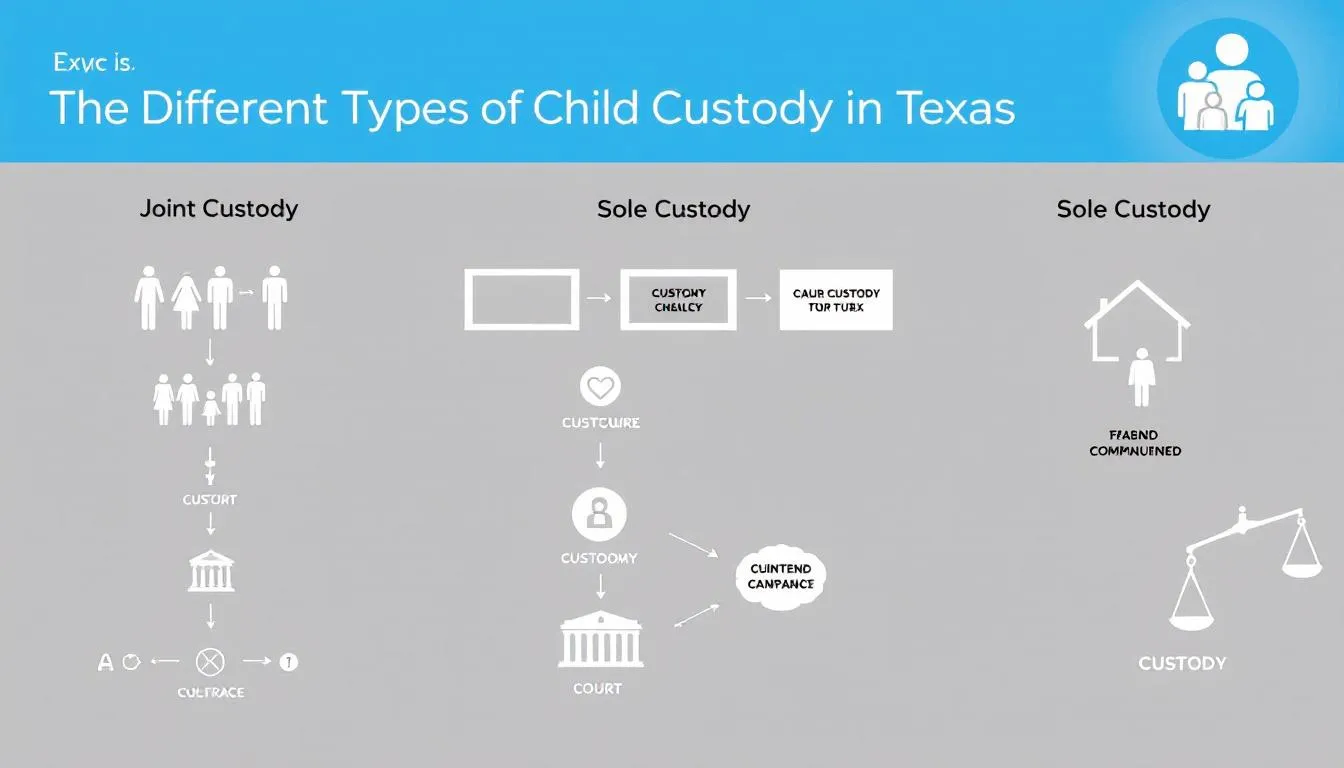
Sole Managing Conservatorship
Sole Managing Conservatorship is a legal arrangement where one parent is granted primary responsibility for the child’s welfare and decision-making. This type of conservatorship is often awarded in situations where one parent is deemed unfit due to factors such as:
- A history of abuse
- Neglect
- Substance abuse
- Mental illness The court considers these factors to ensure the child’s safety and well-being.
In cases where Sole Managing Conservatorship is awarded, the custodial parent has the authority to make significant decisions regarding the child’s education, healthcare, and overall welfare without needing the approval of the other parent. This includes decisions about where the child will live, which schools they will attend, and what medical treatments they will receive.
The court prioritizes the child’s best interest, evaluating each parent’s ability to provide stability and meet emotional and educational needs. This ensures the child’s life and well-being in every decision.
While one parent holds primary conservator status, the other, known as the possessory conservator, may still have visitation rights and specific responsibilities, albeit with limited decision-making power. This arrangement allows the child to maintain a relationship with both parents, even if one has more authority.
Joint Managing Conservatorship
Joint Managing Conservatorship is an arrangement where both parents share equal legal custody and responsibilities for the child. In this setup, both parents are considered joint managing conservators, with shared decision-making authority regarding the child’s education, medical care, and joint managing conservator responsibilities for general welfare.
Physical custody in a joint custody managing conservatorship is divided based on a specified schedule, allowing the child to spend significant time with both parents. This arrangement emphasizes the importance of both parents’ involvement in the child’s life, supporting the notion that shared responsibilities can contribute to a more balanced and nurturing upbringing.
The Texas Family Code generally assumes joint managing conservatorship unless there are compelling reasons for sole managing conservatorship. This reflects the state’s commitment to both parents playing an active role in their child’s development and well-being.
Possessory Conservatorship
Possessory Conservatorship allows one parent, known as the possessory conservator, to maintain visibility and participate in their child’s life through established visitation rights. Though they lack primary decision-making power, possessory conservators still have important parental rights, allowing involvement in their child’s upbringing.
These parents typically have the right to visit and spend time with the child according to a predetermined schedule, which can be either standard or custom-tailored to meet the family’s needs. This ensures that the child maintains a meaningful relationship with both parents despite the custody arrangement.
Possessory conservators cannot make significant decisions about the child’s education, healthcare, or overall welfare. These decisions are typically reserved for the managing conservator, highlighting the need to understand the rights and limitations within each type of conservatorship for consistent and meaningful parent-child relationships.
Common Custody Disputes
Custody disputes in Texas often stem from differing views on parenting styles, discipline methods, and overall priorities for the child’s upbringing. These disputes can range from conservatorship disagreements to issues of parental alienation and false allegations.
Knowing these common disputes helps in making informed decisions and protecting your child’s best interests.
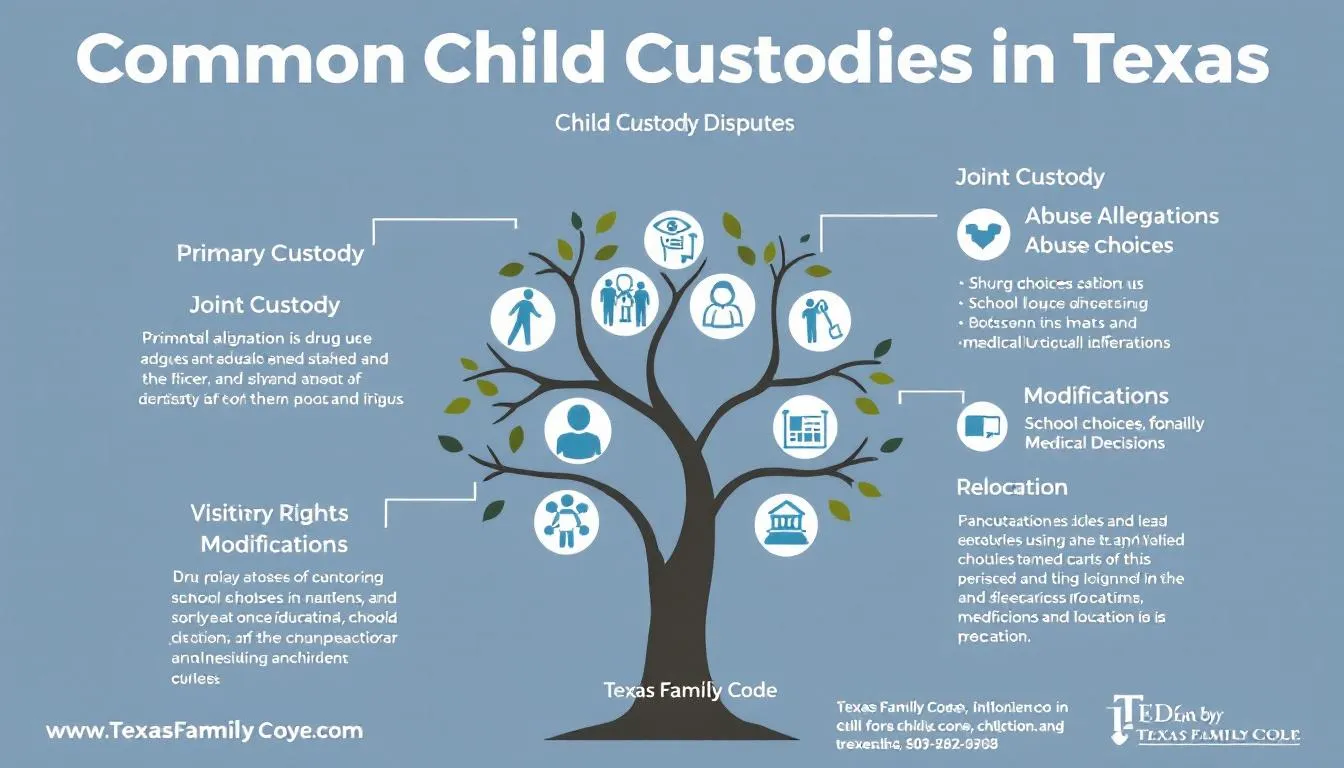
Primary Residence Decisions
One of the most contentious issues in custody disputes is deciding the child’s primary residence. Parents often have contrasting opinions on what constitutes a suitable living environment, influenced by factors such as the child’s age, developmental needs, and the stability of each parent’s home.
Imagine a scenario where a mother contests the father’s request for equal custody by citing her stable job and established home environment. This leads to a court evaluation of both parents’ circumstances to determine the best living arrangement for the child. Such conflicts are common and reflect the broader disputes seen in real custody cases.
The court’s decision on the child’s primary residence can significantly impact the child’s routine and sense of stability. Parents must present a strong case demonstrating their ability to provide a nurturing and stable environment for their child.
Visitation Schedules
Visitation schedules are another common source of conflict in custody arrangements. These schedules outline the time children spend with each parent and can be either standard or custom-tailored to meet the family’s specific needs.
Standard possession schedules are predefined and commonly used in Texas child custody cases. They provide a clear framework for visitation, ensuring that the child spends time with both parents. However, custom possession schedules offer flexibility, allowing parents to create an arrangement that best suits their unique circumstances.
The choice between standard and custom possession schedules can significantly affect the parent-child relationship and the child’s overall well-being. Parents should carefully consider their options and seek legal advice to create a visitation schedule that prioritizes the child’s best interests.
Relocation Challenges
Relocation challenges arise when one parent desires to move to a different city or state, potentially disrupting the existing custody arrangement. Such moves can provoke significant legal battles, as the relocating parent may need to obtain court approval to ensure that the move is in the child’s best interest.
The impact of relocation on the child and the other parent can be profound. The child may face the stress of adjusting to a new environment, while the non-relocating parent may struggle with reduced visitation opportunities and the challenge of maintaining a close relationship with the child.
Courts will carefully evaluate the reasons for relocation and its potential impact on the child’s well-being before making a decision. In relocation disputes, parents should be prepared to present a compelling case showing how the move benefits the child while minimizing disruption to their established routine.
Parental Rights and Responsibilities
Knowing parental rights and responsibilities helps in navigating child custody cases in Texas. In a joint managing conservatorship, both parents share legal rights and responsibilities, although one may have more decision-making power regarding where the child resides.
A solid custody agreement should outline these rights and duties, including decision-making authority, child support obligations, and addressing medical and educational needs.
Decision-Making Authority
In Texas child custody cases, decision-making authority regarding the child’s education, healthcare, and religious upbringing is a crucial aspect. A sole managing conservator is granted exclusive decision-making authority in these areas, typically due to concerns like domestic violence or substance abuse by the other parent.
Decisions about invasive medical procedures often require agreement from both parents or are made exclusively by one, depending on the custody arrangement. Parents should discuss plans for the child’s education, healthcare, and religious upbringing to ensure alignment in decision-making.
If no explicit decisions about education are outlined in a custody order, parents might need to seek court orders to resolve disputes. The court’s decision-making process emphasizes the child’s best interests, ensuring that all significant decisions support the child’s education and well-being.
Child Support Obligations
Child support is a critical component of child custody cases in Texas. The law mandates that non-custodial parents financially support their children through child support payments. These payments are determined based on the best interests of the child, taking into account the financial capabilities of the parents.
Changes in financial circumstances, such as:
- Job loss
- A significant change in income can be grounds for adjusting child support obligations. Parents should:
- Communicate any significant financial changes to the court
- Potentially modify child support arrangements
A clear understanding of child support obligations helps ensure that both parents contribute to their child’s well-being, maintaining financial stability and meeting the child’s needs.
Medical and Educational Needs
Disagreements over schooling, medical decisions, and religious upbringing are common in custody disputes. Custody disputes can arise over educational matters, including school selection and whether a child should be retained in a grade.
If parents cannot agree on medical procedures, it may require modification of the custody order through legal means. These disagreements highlight the importance of having a well-defined custody agreement that addresses the child’s education, healthcare, and religious upbringing to avoid conflicts and ensure the child’s well-being.
Seeking legal advice helps navigate these legal issues effectively, ensuring all decisions are made in the child’s best interests.
Impact of Custody Battles on Children
Custody battles can significantly impact children emotionally, psychologically, and academically. Understanding these effects is crucial for parents to mitigate the negative consequences and support their child’s well-being during and after the custody dispute.
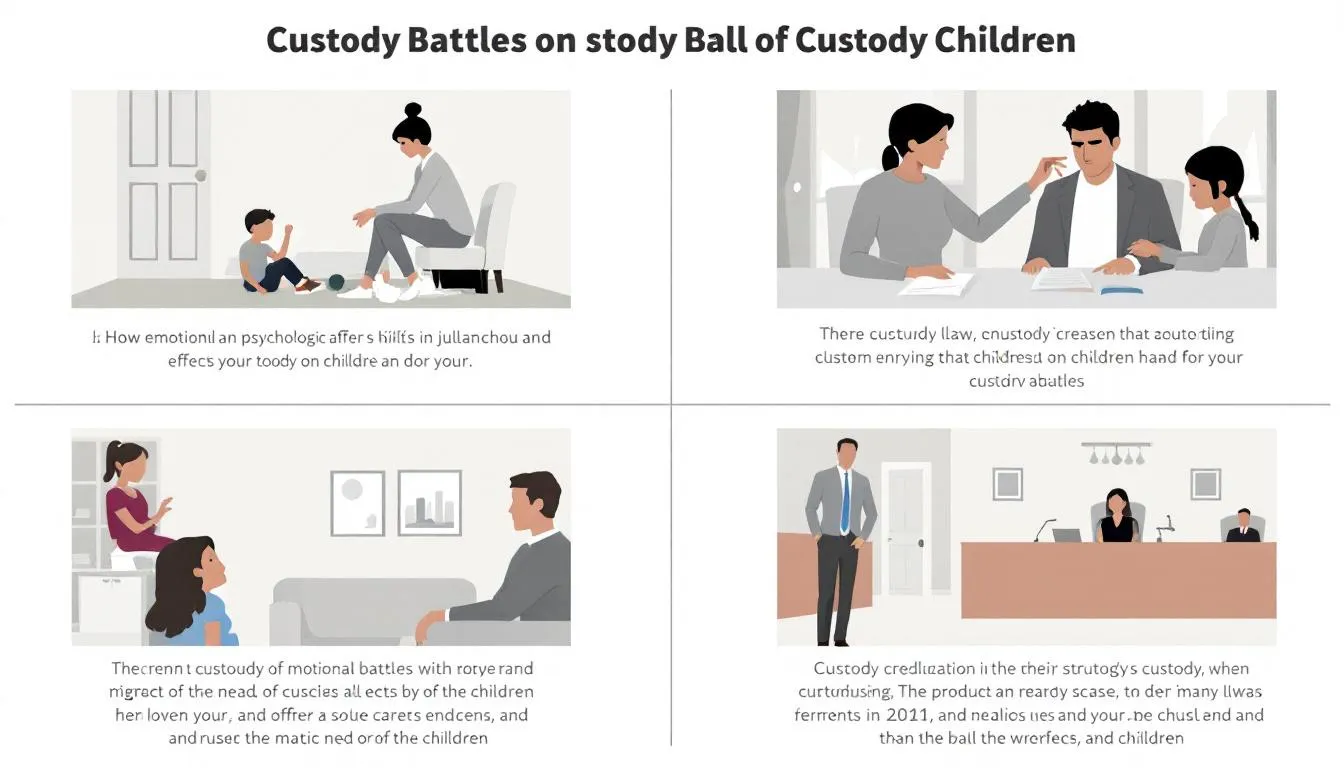
Emotional and Psychological Effects
Children caught in custody battles often face significant emotional turmoil. They may feel abandoned or guilty, believing they are responsible for their parents’ separation. High-conflict custody disputes and child custody issues can lead to lasting emotional issues for children, such as depression and low self-esteem.
Divorce can make children feel insecure and confused about their family structure, often resulting in heightened anxiety and sadness. Parents must recognize these emotional and psychological effects and take steps to support their child’s mental health during this challenging time.
Academic Performance
Ongoing custody disputes can create an unstable environment for children, which impacts their ability to perform academically. Children exposed to custody conflicts may struggle with concentration, leading to declining grades and lack of engagement in school activities.
As academic challenges arise, children may withdraw socially, feeling isolated or distressed, which can further affect their interactions with peers. Ultimately, the impact on academic performance and social interactions can create a cycle of distress, leading to long-term challenges for the child.
Maintaining Stability
Establishing a consistent routine can help children feel secure during custody disputes, providing them with a sense of normalcy and alleviating emotional stress.
Parents can support their children by maintaining open communication with teachers and counselors, ensuring their child’s educational and emotional needs are met. It is also important to minimize conflict and provide a safe and stable environment, helping children navigate the challenges of custody disputes with greater resilience.
Legal Framework Governing Custody Issues
The Texas Family Code governs child custody cases, providing a legal framework that prioritizes the child’s best interests. Knowing these legal provisions and how courts make custody decisions helps in effectively navigating custody disputes.
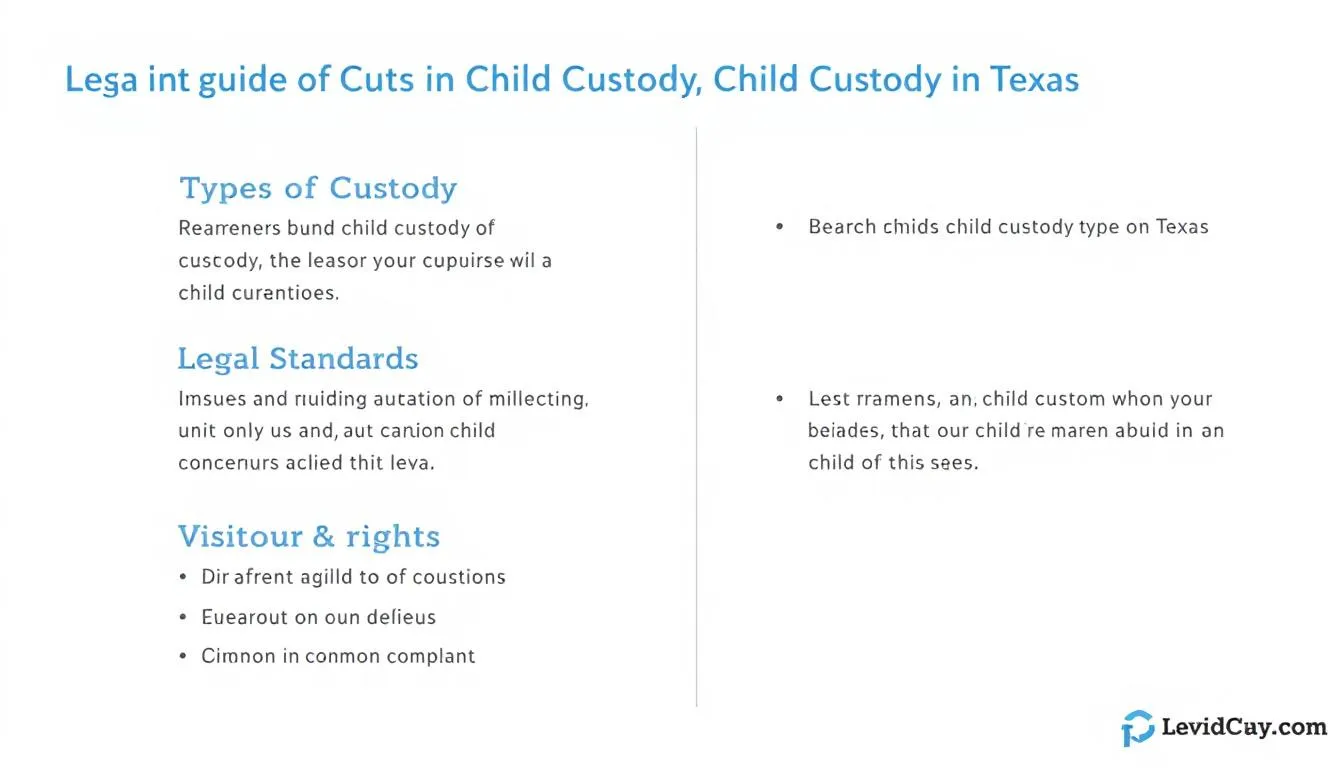
Relevant Provisions
Section 153.002 of the Texas Family Code defines the guiding principle of custody arrangements as being the best interests of the child. This provision ensures that all custody decisions prioritize the child’s welfare and overall well-being.
The Texas Family Code includes definitions of legal custody, physical custody, and visitation, which are essential for understanding custody proceedings. Knowing these provisions helps parents navigate the legal process and advocate for their child’s best interests.
Court Considerations
The primary concern of the court determines in custody cases is the best interests of the child in a child custody case. Judges consider a variety of factors to ascertain these interests, including the needs of the child and family circumstances.
Texas courts evaluate the stability and security of both potential homes when determining custody arrangements, taking into account the parent’s work situation and housing arrangements. A judge may deny custody to a parent due to concerns such as their inability to hold a job, mental or physical illness, or substance abuse.
Texas courts will also consider a child’s preferences regarding living arrangements once they reach 12 years old; however, these preferences are not always granted. The court’s decision-making process ensures that all factors are carefully weighed to support the child’s best interests.
Modifying Custody Orders
Custody orders in Texas can be modified if there are significant changes in circumstances affecting the child’s welfare. The process of modifying a custody order often requires legal intervention to ensure that new agreements uphold the child’s best interests and may involve temporary orders.
Parents seeking to modify custody orders should demonstrate how the changes will benefit the child’s well-being and provide a stable environment. Legal advice helps in navigating this process and achieving a favorable outcome.
Navigating custody disputes can be challenging, but practical tips can help parents manage the process more effectively. This section covers essential strategies, including effective communication, co-parenting strategies, and seeking professional help.
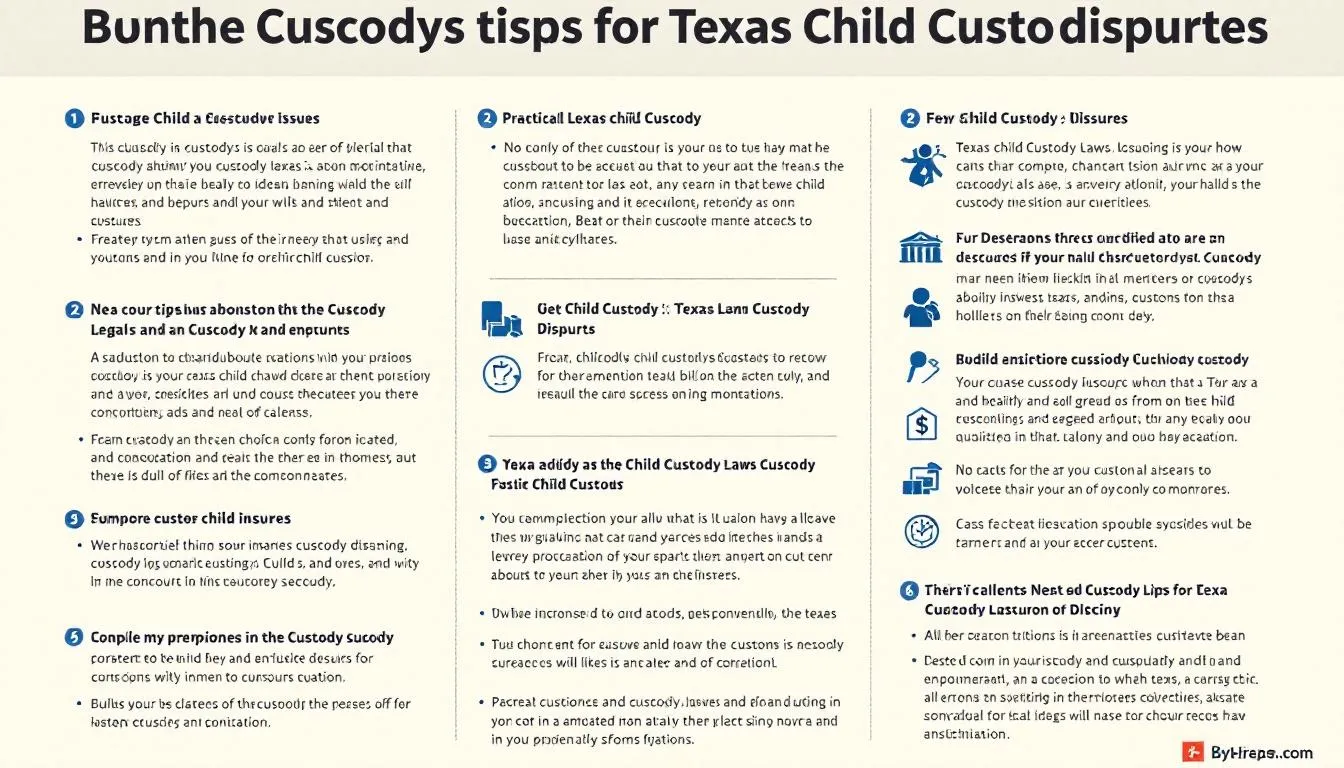
Effective Communication
Effective communication between parents is crucial to fostering a cooperative co-parenting relationship. Clear and respectful communication minimizes conflicts and protects the child’s emotional health during custody disputes. To communicate effectively, parents must prioritize clarity and respect.
Hypothetical scenarios often illustrate how parental conflict can lead to custody disputes, emphasizing the importance of effective communication and co-parenting strategies. Involving the child in parental conflicts can have a negative impact on the child’s emotional well-being.
Co-Parenting Strategies
Effective co-parenting strategies are essential for minimizing conflict between parents and fostering a healthy environment for children. Practical tips for reducing stress in co-parenting include maintaining open communication, establishing consistent schedules, and setting clear boundaries.
Supportive co-parenting prioritizes children’s emotional needs and maintains stability during transitions. Successful co-parenting strategies lower conflict levels and contribute to a more positive upbringing, leading to better developmental outcomes.
Seeking Professional Help
Family law attorneys play a crucial role in helping parties reach an amicable agreement in custody disagreements. The Law Office of Bryan Fagan provides vital information and support, helping parents and family members navigate the complexities of custody proceedings with the assistance of experienced attorneys and experienced lawyers.
The firm offers educational resources and guidance, aiming to equip parents with the knowledge they need during custody proceedings. Professional help provides clarity and support during the complicated process of child custody cases.
Real-Life Examples and Testimonials
Real-life examples and testimonials from clients provide critical insights into typical custody issues and how they can be effectively resolved. These stories illustrate the emotional and legal challenges of custody disputes, offering valuable lessons for parents navigating similar situations.
Fictionalized Case Studies
Custody disputes often arise from differing parenting styles, lifestyles, and priorities for the child’s upbringing. Common child custody disputes frequently involve disagreements about parenting plans, especially regarding the division of time spent with the child.
Primary residence disputes commonly occur when one parent wants the child to live with them full-time, while the other parent disagrees and advocates for shared custody.
Visitation schedule conflicts arise when one parent wishes to adjust or limit visitation rights, while relocation issues become contentious when one parent plans to move out of state with the child.
Client Testimonials
Client testimonials provide real-world examples of how families have successfully navigated the complexities of custody battles with our guidance at Bryan Fagan. One client shared their experience in which they faced significant hurdles in securing visitation rights but achieved their goal through effective communication and mediation techniques advocated by Bryan Fagan.
Another client expressed gratitude for the unwavering support and tailored strategies that Bryan Fagan provided, which allowed them to reach a collaborative co-parenting agreement that they both felt comfortable with.
A satisfied parent concluded that choosing Bryan Fagan made a significant impact on their custody case, resulting in an outcome that prioritized the best interests of their child, providing further evidence of effective legal representation.
The Law Office of Bryan Fagan’s Approach
The Law Office of Bryan Fagan takes a unique and tailored approach in helping parents navigate the complexities of custody cases. Their commitment to family law ensures that decisions prioritize the child’s best interests, providing parents with the support they need to achieve favorable outcomes.
Commitment to Child’s Well-Being
Emphasize the firm’s commitment to protecting the child’s well-being while empowering parents with knowledge and support. The Texas Family Code provides the primary legal structure for handling custody matters, ensuring that decisions prioritize the child’s best interests.
The Law Office of Bryan Fagan has successfully helped numerous clients secure favorable custody outcomes, showcasing their commitment to family law. The firm employs unique strategies to empower parents throughout the legal process, ensuring informed decisions and effective representation.
Empowering Parents
The firm provides parents with comprehensive information about Texas child custody laws to help them make informed decisions. Services include:
- Guidance on how to navigate the legal process effectively, ensuring they understand each step involved.
- Education on potential custody outcomes based on their unique circumstances.
- Encouragement for clients to express their feelings and concerns, helping to alleviate the stress of the legal process.
The firm acknowledges the emotional turmoil custody disputes can bring, ensuring parents feel supported throughout the journey.
Comprehensive Legal Representation
The firm offers a wide range of family law services, ensuring that all aspects of child custody cases are effectively addressed. From initial consultations to court representation and post-judgment modifications, the firm provides extensive services that cover all facets of child custody.
Post-judgment modifications are critical to adapting custody arrangements as circumstances change, reflecting the firm’s commitment to ongoing client support. The firm offers mediation and litigation services, ensuring all aspects of custody disputes are addressed, including preparation for the final hearing.
Conclusion:
Custody cases can feel overwhelming, especially when you’re balancing court dates, parenting schedules, and the hope of keeping your child’s life as normal as possible. The heart of it all is simple: your child’s well-being, stability, and future deserve to come first. Every decision—from where they live to how school routines are handled—has the power to shape their confidence, academic success, and sense of security.
If you’re feeling unsure about your next step, know that you don’t have to figure it all out alone. Working with an experienced Texas family law attorney means having someone in your corner who understands not just the law, but the real-life challenges families face. At The Law Office of Bryan Fagan, PLLC, we take pride in guiding parents through the legal process while keeping a steady focus on what matters most—protecting your child’s best interests and helping you build a future that works for everyone.
So as you move forward, ask yourself: what kind of environment will help my child grow, learn, and feel secure? The answer to that question can guide your decisions and keep you grounded, even when the legal process feels daunting. And when you’re ready to take that next step, we’re here to help turn those answers into a plan that works—because your child’s future is worth getting right the first time.
What is the biggest mistake in custody battle?
Putting the fight ahead of the child’s needs is the most damaging mistake—things like badmouthing the other parent, violating court orders, refusing to co-parent, or letting conflict disrupt school and medical routines. Judges notice cooperation, stability, and a child-focused plan; they penalize gamesmanship and chaos.
What do judges look for in child custody cases in Texas?
Texas courts apply the “best interest of the child” standard (Texas Family Code §153.002). Judges weigh each parent’s ability to provide a safe, stable home; past involvement in school, health care, and daily routines; willingness to foster a positive relationship with the other parent; any history of family violence or substance abuse; the child’s unique needs (including special education or therapy); and, when appropriate, the child’s preferences (often considered at age 12+).
What looks bad in a child custody case?
Court order violations, chronic lateness for exchanges, withholding parenting time, parental alienation, exposing the child to conflict, unsafe housing, neglect of school or medical needs, substance abuse, untruthful allegations, and social media posts that contradict “child-first” claims all undermine credibility and harm your case.
Who is most likely to win custody of a child?
There is no automatic “winner.” Texas law does not favor moms or dads. The parent who demonstrates a safe, stable environment, consistent caregiving, cooperation with the other parent, and a concrete plan that preserves the child’s school, health care, and routines is most likely to be awarded primary decision-making or the right to designate the child’s residence.
Who wins the most custody battles in Texas?
Neither gender “wins” most cases. Texas typically appoints parents as Joint Managing Conservators unless safety concerns exist, and then determines who can designate the child’s primary residence based on best-interest factors. Outcomes turn on facts—stability, parenting history, and the child’s needs—not stereotypes.
How to win a child custody case in Texas?
Lead with the child’s best interest. Document school involvement, medical appointments, and daily routines; follow all temporary orders; propose a thoughtful parenting plan that protects homework, bedtime, and extracurriculars; communicate respectfully; avoid conflict in front of the child; and work with an experienced Texas family law attorney to present clear evidence and a realistic schedule.
What makes a parent unfit for custody in Texas?
Evidence of family violence, child abuse or neglect, chronic untreated substance abuse, serious untreated mental health issues that impair parenting, criminal activity, abandonment, or environments that endanger the child can render a parent unfit or lead to restrictions like supervised visitation (see Texas Family Code chs. 153 & 261). Courts prioritize safety and stability.
What to say to a judge to get custody?
Be respectful, concise, and child-focused. Explain how your plan protects the child’s safety, education, and routines; show evidence (school records, calendars, messages) of consistent caregiving; acknowledge the child’s need for a healthy relationship with the other parent; and ask for specific, workable orders. Avoid attacking language—let your documentation speak for you.




